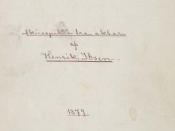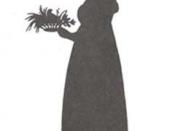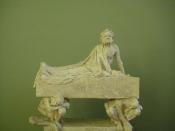In both modern and classic literature, many authors make ties to their personal lives. These personal ties are popular among authors because it allows the author to "get inside" their character's heads and give the characters identical situations and emotional responses as the author has experienced in their own life. Another major reason that authors tie to their own life is the fact that they can make a statement about their beliefs and perhaps bring about change. The change can sometimes be subtle, but can also be extremely drastic, depending on the number of followers and rivals their work of literature has. In the play A Doll's House by Henrik Ibsen, elements such as characters, illness and money during the duration of the play are directly tied to Ibsen's life.
To understand the links to A Doll's House from Ibsen's life, one must first understand the path that Ibsen's life followed.
Henrik Ibsen was born in Skien, Norway in 1828. His father was a prosperous merchant, and Ibsen's family lived comfortably. In the mid 1830's, Ibsen's father went bankrupt, and the family was forced to live a very simple lifestyle in the country ("Ibsen, Henrik"), Many sources claim that Ibsen was very introverted as a young person, and rarely sought attention. One account of Ibsen's life gave the reason of Ibsen's introverted state by claiming that "a rumor, to which young Ibsen was privy, began to be circulated that Henrik was the illegitimate son of another man" ("Biography of Ibsen") Though it has never been proven or disproved, Ibsen has produced plays that include illegitimate offspring, showing readers that Ibsen is a writer who writes plays with personal accounts and ties to the plot line.
In A Doll's House, probably the most evident tie to Ibsen's life are...


